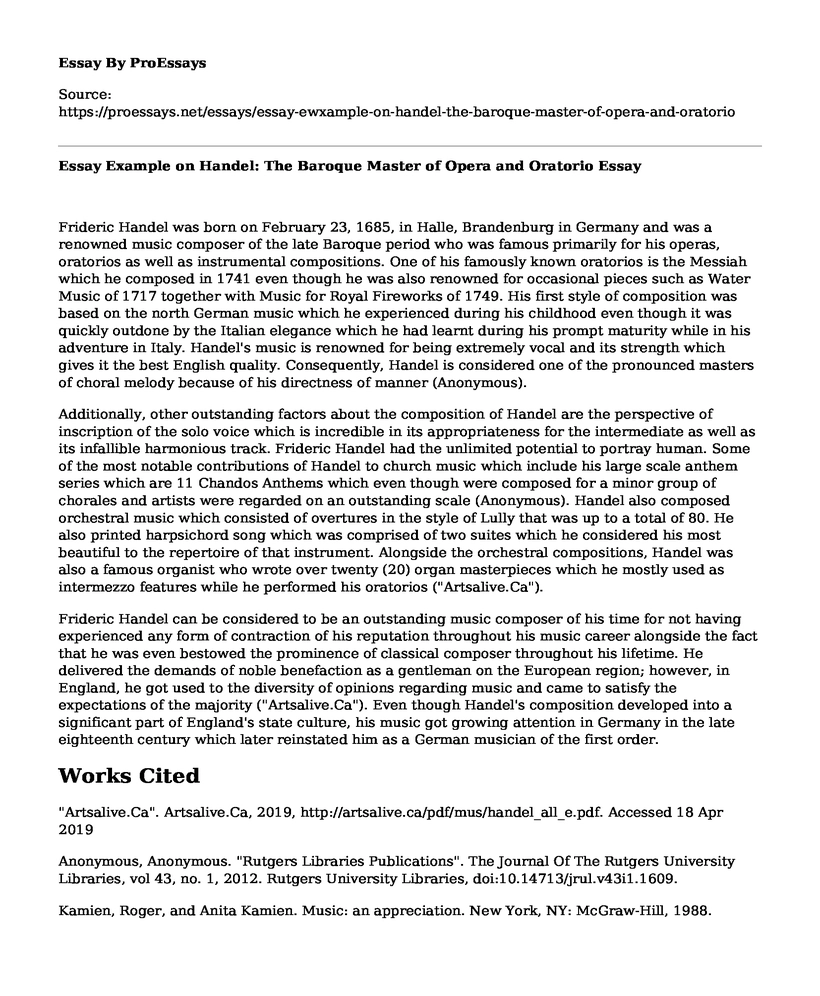Frideric Handel was born on February 23, 1685, in Halle, Brandenburg in Germany and was a renowned music composer of the late Baroque period who was famous primarily for his operas, oratorios as well as instrumental compositions. One of his famously known oratorios is the Messiah which he composed in 1741 even though he was also renowned for occasional pieces such as Water Music of 1717 together with Music for Royal Fireworks of 1749. His first style of composition was based on the north German music which he experienced during his childhood even though it was quickly outdone by the Italian elegance which he had learnt during his prompt maturity while in his adventure in Italy. Handel's music is renowned for being extremely vocal and its strength which gives it the best English quality. Consequently, Handel is considered one of the pronounced masters of choral melody because of his directness of manner (Anonymous).
Additionally, other outstanding factors about the composition of Handel are the perspective of inscription of the solo voice which is incredible in its appropriateness for the intermediate as well as its infallible harmonious track. Frideric Handel had the unlimited potential to portray human. Some of the most notable contributions of Handel to church music which include his large scale anthem series which are 11 Chandos Anthems which even though were composed for a minor group of chorales and artists were regarded on an outstanding scale (Anonymous). Handel also composed orchestral music which consisted of overtures in the style of Lully that was up to a total of 80. He also printed harpsichord song which was comprised of two suites which he considered his most beautiful to the repertoire of that instrument. Alongside the orchestral compositions, Handel was also a famous organist who wrote over twenty (20) organ masterpieces which he mostly used as intermezzo features while he performed his oratorios ("Artsalive.Ca").
Frideric Handel can be considered to be an outstanding music composer of his time for not having experienced any form of contraction of his reputation throughout his music career alongside the fact that he was even bestowed the prominence of classical composer throughout his lifetime. He delivered the demands of noble benefaction as a gentleman on the European region; however, in England, he got used to the diversity of opinions regarding music and came to satisfy the expectations of the majority ("Artsalive.Ca"). Even though Handel's composition developed into a significant part of England's state culture, his music got growing attention in Germany in the late eighteenth century which later reinstated him as a German musician of the first order.
Works Cited
"Artsalive.Ca". Artsalive.Ca, 2019, http://artsalive.ca/pdf/mus/handel_all_e.pdf. Accessed 18 Apr 2019
Anonymous, Anonymous. "Rutgers Libraries Publications". The Journal Of The Rutgers University Libraries, vol 43, no. 1, 2012. Rutgers University Libraries, doi:10.14713/jrul.v43i1.1609.
Kamien, Roger, and Anita Kamien. Music: an appreciation. New York, NY: McGraw-Hill, 1988.
Cite this page
Essay Example on Handel: The Baroque Master of Opera and Oratorio. (2022, Dec 27). Retrieved from https://proessays.net/essays/essay-ewxample-on-handel-the-baroque-master-of-opera-and-oratorio
If you are the original author of this essay and no longer wish to have it published on the ProEssays website, please click below to request its removal:
- Paper Example on Ethics in Documentary Filmmaking
- Quetzali Essay Example
- The Big Short Essay Example
- The "Unfinished Work" by Kenneth McFarland - Literary Analysis Essay
- Essay Example on Aladdin: Movie Soundtracks Enhancing the Production
- Design Frictions: Balancing Efficiency and User Friction - Essay Sample
- Essay Sample on Seed: The Untold Story - Uncovering Challenges in Agro-Industry







